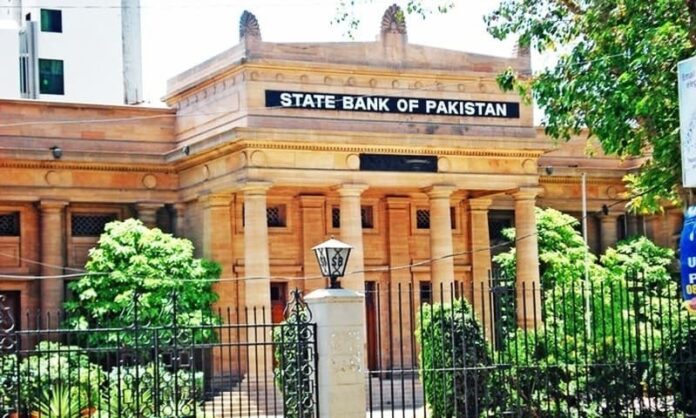KARACHI: The State Bank of Pakistan (SBP) has decided to cut the country’s policy rate by 200 basis points from 11pc to 9pc, in an emergency meeting held on Thursday.
This is the third time in five weeks that the SBP has slashed the policy rate, cutting it by 75 basis points to 12.5pc on March 17, and 150 basis points to 11pc on March 24.
This is also the first time that the policy rate is in single digits, since October 2018, when it stood at 8.5pc.
The Monetary Policy Committee said this action would cushion the impact of coronavirus shock on growth and employment, while also maintaining financial stability.
In explaining its rationale for cutting the policy rate, the SBP said it had taken the global and domestic outlook had further deteriorated in the wake of the COVID-19 pandemic.3. These imply a downward revision in the outlook for growth and inflation in Pakistan, as per the SBP.
Pakistan’s economy is expected to contract by -1.5pc in fiscal year 2020 before recovering to around 2pc growth in fiscal year 2021. The SBP also said inflation is expected to be close to the lower end of the previously announced 11-12pc range this fiscal year, and to fall to 7-9pc range next fiscal year.
On the global front, according to the SBP, the world economy is expected to enter into the sharpest downturn since the Great Depression, contracting by as much as 3pc in 2020, according to projections released this week by the IMF.
“This is a much deeper recession than the 0.07 percent contraction during the global financial crisis in 2009,” said the central bank.
The SBP also noted that global oil prices have plummeted further, with futures markets suggesting low prices will persist.
Meanwhile in Pakistan, high-frequency indicators of activity―such as retail sales, credit card spending, cement production, export orders, tax collections, and mobility data from Google’s recently introduced Community Mobility Reports―had suggested a significant slowdown in most parts of the economy in recent weeks.
National CPI inflation surged to 14.6pc in January 2020, before a deceleration in February 2020 to 12.4pc, and a further deceleration to 10.24pc in March.
While the SBP did note that March’s inflation figure and more recent weekly SPI releases in April also show a marked reduction in inflation momentum, this was not a cause to celebrate.
“While there are some upside risks to headline inflation in case of temporary supply disruptions or food price shocks, these are unlikely to generate strong second-round effects due to the weakness of the economy,” the central bank said.
It also said the inflationary impact of the recent exchange rate depreciation is expected to be contained given low import demand and falling global prices.
The SBP also gave a short explanation in the announcement regarding concerns about the real interest rate, defined as the policy rate minus inflation rate. So far, the previous policy rate (11pc) had been higher than the inflation rate (10.24pc).
Given that the SBP thinks that the inflation rate will fall to the 7-9 percent range next fiscal year, it said that the new decision will reduce forward-looking real interest rates to around zero.
“This is about the middle of the range across most emerging markets,” the SBP clarified.
The SBP said this rate cut would complement other measures taken by the SBP to support the economy. In the last five weeks, the SBP has taken 11 different measures to mitigate any adverse impact of the pandemic, including concessional financing to companies that do not lay off workers; one-year extension in principal payments; doubling of the period for rescheduling of loans from 90 to 180 days, and concessional financing for hospitals and medical centers.
After the previous interest rate cuts on March 17 and March 24 were announced, many had felt that the SBP should have reduced the policy cut even further in light of the global pandemic. This latest decision may appease both analysts and business people, along with the latest refinancing schemes.
According to Profit sources, market sentiments show that the business community is pleased with the functioning of the SBP and the measures taken amidst the spread of the virus. One analyst said this will turn further the trust in the institution, and act as a stimulus for the economy.
According to Saad Hashmi, executive director at BMA Capital, this news comes as a “pleasant surprise and much-needed one.” He added that the cut in the policy rate along with support packages by the government is done with the intention of saving businesses.
“The market is taking this additional emergency action by SBP as a cushion to small and medium enterprises. As a result, this may help sustain employment and going forward once the virus subsides, may boost employment again,” he said.
However, a banker contacted by Profit said he was concerned about the outflow of money leaving Pakistan’s economy. “Market sentiments and global trends dictate that this rate cut will again trigger a wave of withdrawals and the rupee is likely to be under pressure,” he said.
Hashmi, however, said that the rupee is likely to remain stable, citing the contraction in demand as the reason behind the outflow. “Due to the fall in imports the impact on the rupee will be subdued,” he noted.
In making this decision, the SBP is mimicking actions taken by other central banks around the world, which have been trying to combat the economic repercussions of COVID-19. This slash in the interest rate is seen as a preemptive action rather than a reactive action.
The US Fed Reserve, European Central Bank, Bank of England, and 22 other central banks around the world have all cut their policy rates to varying degrees, to try to help shore up their economies amid the pandemic.
The SBP had last changed the policy rate on July 16, 2019, to 13.25pc with a rise of 100 basis points. At the time, it cited increased potential inflation owing to a rise in utility costs.
The central bank further kept the policy rate unchanged in its reviews on September 16 and November 2 in 2019, and on January 28 in 2020. It then finally the policy rate to by 75 basis points to 12.5pc on March 17, and to 11pc on March 24.
At the start of 2019, the policy rate was 10pc. Subsequent policy reviews – in January, March, May, and July – increased the policy rate by a total of 325 basis points.
























